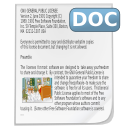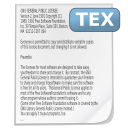Register & Indexing
 Google Scholar is a freely accessible web search engine that indexes scholarly literature's full text or metadata across an array of publishing formats and disciplines. Released in beta in November 2004, the Google Scholar index includes most peer-reviewed online academic journals and books, conference papers, theses and dissertations, preprints, abstracts, technical reports, and other scholarly literature, including court opinions and patents. The Google Scholar journal's profile is available in the next link.
Google Scholar is a freely accessible web search engine that indexes scholarly literature's full text or metadata across an array of publishing formats and disciplines. Released in beta in November 2004, the Google Scholar index includes most peer-reviewed online academic journals and books, conference papers, theses and dissertations, preprints, abstracts, technical reports, and other scholarly literature, including court opinions and patents. The Google Scholar journal's profile is available in the next link.
The DOAJ (Directory of Open Access Journals) was launched in 2003 with 300 open access journals. Today, this independent database contains over 15 000 peer-reviewed open-access journals covering all areas of science, technology, medicine, social sciences, arts, and humanities. Open access journals from all countries and languages are welcome to apply for inclusion. DOAJ’s mission is to increase the visibility, accessibility, reputation, usage, and impact of quality, peer-reviewed, open-access scholarly research journals globally, regardless of discipline, geography or language. DOAJ is committed to being 100% independent and maintaining its primary services and metadata as free to use or reuse for everyone. The DOAJ journal's profile is available in the next link.
 The Latindex Catalog 2.0 comprises journals that meet quality standards following the Latindex methodology. The first version of the Catalog began in 2002 and was replaced in 2018 by version 2.0, which includes 38 features applicable only to online journals. The methodology can be consulted at: http://www.latindex.org/postulacion/postulacionCatalogo. The journals that enter the Catalog are accompanied by a brief description of their nature and scope and an image of their cover. The Catalog is not an evaluation instrument per se but a reference service specializing in the quality characteristics of each journal. The Latindex Catalog 2.0 journal's profile is available in the next link.
The Latindex Catalog 2.0 comprises journals that meet quality standards following the Latindex methodology. The first version of the Catalog began in 2002 and was replaced in 2018 by version 2.0, which includes 38 features applicable only to online journals. The methodology can be consulted at: http://www.latindex.org/postulacion/postulacionCatalogo. The journals that enter the Catalog are accompanied by a brief description of their nature and scope and an image of their cover. The Catalog is not an evaluation instrument per se but a reference service specializing in the quality characteristics of each journal. The Latindex Catalog 2.0 journal's profile is available in the next link.
 Redalyc is an indexing system that integrates high-quality scientific and editorial journals from the region into its index. After 16 years of giving visibility and supporting the consolidation of journals, it now exclusively integrates those that share the model. non-profit publication to preserve scientific communication's academic and open nature from any region. The Redalyc journal's profile is available in the next link.
Redalyc is an indexing system that integrates high-quality scientific and editorial journals from the region into its index. After 16 years of giving visibility and supporting the consolidation of journals, it now exclusively integrates those that share the model. non-profit publication to preserve scientific communication's academic and open nature from any region. The Redalyc journal's profile is available in the next link.
 Crossref is a not-for-profit association of approximately 2,000 voting member publishers representing 4,300 societies and publishers, including non-profit and commercial organizations. Crossref links millions of items from a variety of content types, including journals, books, conference proceedings, working papers, technical reports, and datasets. Linked content includes materials from scientific, technical, and medical disciplines and social sciences and humanities. Crossref provides the technical and commercial infrastructure to provide this reference link using digital object identifiers (DOIs). Crossref provides a deposit and consultation service for your DOIs. The Crossref journal's profile is available in the next link.
Crossref is a not-for-profit association of approximately 2,000 voting member publishers representing 4,300 societies and publishers, including non-profit and commercial organizations. Crossref links millions of items from a variety of content types, including journals, books, conference proceedings, working papers, technical reports, and datasets. Linked content includes materials from scientific, technical, and medical disciplines and social sciences and humanities. Crossref provides the technical and commercial infrastructure to provide this reference link using digital object identifiers (DOIs). Crossref provides a deposit and consultation service for your DOIs. The Crossref journal's profile is available in the next link.
 Dialnet is one of the largest bibliographic portals in the world, whose primary mission is to provide further visibility to Hispanic scientific literature. Focused fundamentally on the fields of Human, Legal, and Social Sciences, Dialnet is constituted as a fundamental tool for searching for quality information. The Google Scholar journal's profile is available in the next link.
Dialnet is one of the largest bibliographic portals in the world, whose primary mission is to provide further visibility to Hispanic scientific literature. Focused fundamentally on the fields of Human, Legal, and Social Sciences, Dialnet is constituted as a fundamental tool for searching for quality information. The Google Scholar journal's profile is available in the next link.
The National Digital Repository of Science, Technology, and Innovation, called ALICIA (Free Access to Scientific Information), offers open access to the intellectual heritage resulting from production in the science, technology and innovation carried out in public sector entities or with State financing. From this platform, the National Council for Science, Technology and Technological Innovation - CONCYTEC contributes to conserving, preserving, and offering open access to national scientific production (books, publications, articles in specialized magazines, technical-scientific works, computer programs, processed data, and monitoring statistics, academic theses and the like), making it available to the academic and scientific community and society in general. The ALICIA journal's profile is available in the next link.
The Federated Network of Institutional Repositories of Scientific Publications, or LA Reference, is a Latin American network of open-access repositories. Its services support national Open Access strategies in Latin America through a platform with interoperability standards, sharing and giving visibility to the scientific production generated in higher education and scientific research institutions. From the national nodes, scientific articles, doctoral and master's theses are integrated, coming from more than a hundred universities and research institutions of the ten countries that today make up THE Reference. Argentina, Brazil, Chile, Colombia, Costa Rica, Ecuador, El Salvador, Spain, Mexico, Panama, Peru, and Uruguay are active network members. The La Referencia journal's profile is available in the next link.
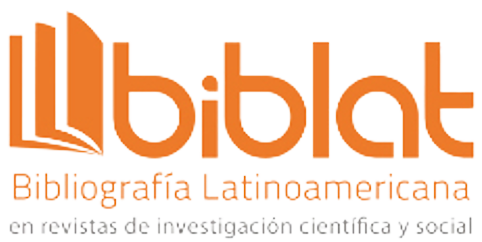 BIBLAT is a portal specialized in scientific and academic journals published in Latin America and the Caribbean, which offers the following services: Bibliographical references of articles and documents published in more than 3,000 titles indexed in CLASS and PERIODICA, through primary and advanced search options. Access to the full text of articles published in open access journals. BIBLAT offers two types of access to the full text: through hypertext links to journal websites (external resources) and the digital collection of the Latin American Virtual Hemeroteca of the General Directorate of Libraries and Digital Information Services DGBSDI, National Autonomous University of Mexico UNAM. Frequencies and bibliometric indicators were extracted from the journals indexed in CLASE and PERIÓDICA, in the SciELO collections, and from other sources of information. The BIBLAT journal's profile is available in the next link.
BIBLAT is a portal specialized in scientific and academic journals published in Latin America and the Caribbean, which offers the following services: Bibliographical references of articles and documents published in more than 3,000 titles indexed in CLASS and PERIODICA, through primary and advanced search options. Access to the full text of articles published in open access journals. BIBLAT offers two types of access to the full text: through hypertext links to journal websites (external resources) and the digital collection of the Latin American Virtual Hemeroteca of the General Directorate of Libraries and Digital Information Services DGBSDI, National Autonomous University of Mexico UNAM. Frequencies and bibliometric indicators were extracted from the journals indexed in CLASE and PERIÓDICA, in the SciELO collections, and from other sources of information. The BIBLAT journal's profile is available in the next link.
 Semantic Scholar provides free, AI-driven search and discovery tools, and open resources for the global research community. It index over 200 million academic papers sourced from publisher partnerships, data providers, and web crawls. With Semantic Scholar, researchers can understand a paper at a glance. The system extracts meaning and identifies connections from within papers, then surfaces these insights to help Scholars discover and understand research. The Semantic Scholar journal's profile is available in the next link.
Semantic Scholar provides free, AI-driven search and discovery tools, and open resources for the global research community. It index over 200 million academic papers sourced from publisher partnerships, data providers, and web crawls. With Semantic Scholar, researchers can understand a paper at a glance. The system extracts meaning and identifies connections from within papers, then surfaces these insights to help Scholars discover and understand research. The Semantic Scholar journal's profile is available in the next link.
CORE harvests research papers from data providers worldwide, including institutional and subject repositories, open access, and hybrid journal publishers. CORE currently contains 202,610,445 open access articles from thousands and over tens of thousands of journals collected from 10,237 data providers worldwide. The CORE journal's profile is available in the next link.
 Dimensions is a database of research, which links grants to resulting publications, clinical trials and patents. The company focuses on strategic investments into startup companies that support the research lifecycle. Dimensions covers millions of research publications connected by more than 1.8 billion citations, supporting grants, datasets, clinical trials, patents and policy documents. The Dimensions journal's profile is available in the next link.
Dimensions is a database of research, which links grants to resulting publications, clinical trials and patents. The company focuses on strategic investments into startup companies that support the research lifecycle. Dimensions covers millions of research publications connected by more than 1.8 billion citations, supporting grants, datasets, clinical trials, patents and policy documents. The Dimensions journal's profile is available in the next link.
 PERIÓDICA is a bibliographic database created in 1978 at the National Autonomous University of Mexico (UNAM). Contains bibliographic records of original articles, technical reports, case studies, statistics, and other documents published in nearly 1,500 Latin American and Caribbean journals specializing in science and technology. The PERIÓDICA journal's profile is available in the next link.
PERIÓDICA is a bibliographic database created in 1978 at the National Autonomous University of Mexico (UNAM). Contains bibliographic records of original articles, technical reports, case studies, statistics, and other documents published in nearly 1,500 Latin American and Caribbean journals specializing in science and technology. The PERIÓDICA journal's profile is available in the next link.
The MIAR database gathers critical information for the identification and analysis of journals. These are grouped into large scientific areas - subdivided into more specific academic fields. The system creates a correspondence matrix between the journals, identified by their ISSN, and the databases and repertoires that index or include them. In addition, the link to the websites of the editors and institutions responsible for the repertoires and sources is indicated whenever it is available. MIAR is a support instrument for those who have to carry out evaluation tasks: they now have data on the identity and dissemination of the journals where the works subject to evaluation are published. The MIAR journal's profile is available in the next link.
 ResearchBib is open access with a high-standard indexing database for researchers and publishers. Research Bible may freely index journals, research papers, call for papers, and research positions. The ResearchBib journal's profile is available in the next link.
ResearchBib is open access with a high-standard indexing database for researchers and publishers. Research Bible may freely index journals, research papers, call for papers, and research positions. The ResearchBib journal's profile is available in the next link.
 ICI World of Journals is an essential tool recommended for every scientific journal, enabling it to strengthen its digitalization process. Within the ICI World of Journals database framework, every Editorial office gets free of charge access to the IT system, which enables managing Journal Passports. The system represents a new way of scientific periodical presentations in the virtual world. The ICI World of Journals journal's profile is available in the next link.
ICI World of Journals is an essential tool recommended for every scientific journal, enabling it to strengthen its digitalization process. Within the ICI World of Journals database framework, every Editorial office gets free of charge access to the IT system, which enables managing Journal Passports. The system represents a new way of scientific periodical presentations in the virtual world. The ICI World of Journals journal's profile is available in the next link.
 OpenAIRE is a European project supporting Open Science. On the one hand, OpenAIRE is a network of dedicated Open Science experts promoting and providing training on Open Science. On the other hand, OpenAIRE is a technical infrastructure harvesting research output from connected data providers. OpenAIRE aims to establish an open and sustainable scholarly communication infrastructure responsible for the overall management, analysis, manipulation, provision, monitoring, and cross-linking of all research outcomes. The Open AIRE journal's profile is available in the next link.
OpenAIRE is a European project supporting Open Science. On the one hand, OpenAIRE is a network of dedicated Open Science experts promoting and providing training on Open Science. On the other hand, OpenAIRE is a technical infrastructure harvesting research output from connected data providers. OpenAIRE aims to establish an open and sustainable scholarly communication infrastructure responsible for the overall management, analysis, manipulation, provision, monitoring, and cross-linking of all research outcomes. The Open AIRE journal's profile is available in the next link.
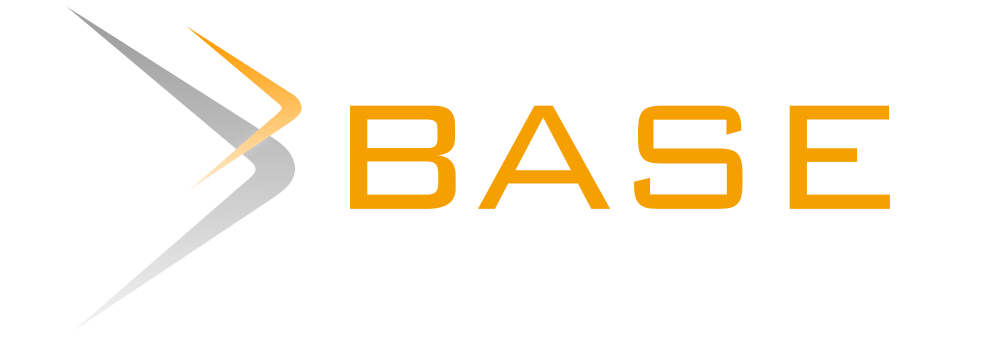 BASE (Bielefeld Academic Search Engine) is a multi-disciplinary search engine for scholarly internet resources created by Bielefeld University Library in Bielefeld, Germany. It harvests OAI metadata from institutional repositories and other academic digital libraries that implement the Open Archives Initiative Protocol for Metadata Harvesting (OAI-PMH) and then normalizes and indexes the data for searching. In addition to OAI metadata, the library indexes selected websites and local data collections, which can be searched via a single search interface. The BASE journal's profile is available in the next link.
BASE (Bielefeld Academic Search Engine) is a multi-disciplinary search engine for scholarly internet resources created by Bielefeld University Library in Bielefeld, Germany. It harvests OAI metadata from institutional repositories and other academic digital libraries that implement the Open Archives Initiative Protocol for Metadata Harvesting (OAI-PMH) and then normalizes and indexes the data for searching. In addition to OAI metadata, the library indexes selected websites and local data collections, which can be searched via a single search interface. The BASE journal's profile is available in the next link.
 Directory of Research Journal Indexing(DRJI) is one of the world's most voluminous search engines, especially for academic open access web resources. Directory of Research Journal Indexing is a digital collection of education research and information. Each DRJI record contains bibliographic data (title, author, ISSN or ISBN, publisher information, etc.) and an abstract. If made available by the publisher, DRJI includes links to the full text or the publisher's site. The DRJI journal's profile is available in the next link.
Directory of Research Journal Indexing(DRJI) is one of the world's most voluminous search engines, especially for academic open access web resources. Directory of Research Journal Indexing is a digital collection of education research and information. Each DRJI record contains bibliographic data (title, author, ISSN or ISBN, publisher information, etc.) and an abstract. If made available by the publisher, DRJI includes links to the full text or the publisher's site. The DRJI journal's profile is available in the next link.
 EuroPub is a comprehensive, multipurpose database covering scholarly literature, with indexed records from active, authoritative journals and indexes articles from journals worldwide. The result is an exhaustive database that assists research in every field. Easy access to a vast database in one place reduces searching and data reviewing time considerably and helps authors prepare new articles to a great extent. EuroPub aims to increase the visibility of open access to scholarly journals, promoting increased usage and impact. The EuroPub journal's profile is available in the next link.
EuroPub is a comprehensive, multipurpose database covering scholarly literature, with indexed records from active, authoritative journals and indexes articles from journals worldwide. The result is an exhaustive database that assists research in every field. Easy access to a vast database in one place reduces searching and data reviewing time considerably and helps authors prepare new articles to a great extent. EuroPub aims to increase the visibility of open access to scholarly journals, promoting increased usage and impact. The EuroPub journal's profile is available in the next link.
 LivRe! is the portal developed by CNEN - Comissão Nacional de Energia Nuclear (Brazilian National Nuclear Energy Commission), through its CIN - Centro de Informações Nucleares (Nuclear Information Center), aiming to ease the identification and access to free journals available on the Internet. The Portal covers scientific journals, magazines, bulletins, and newsletters. Beyond displaying journals by the initial letter of their title, searches can be done by title words and subject field. Searches can be refined by selecting only peer-reviewed journals or only journals indexed by any secondary source. The LivRe! journal's profile is available in the next link.
LivRe! is the portal developed by CNEN - Comissão Nacional de Energia Nuclear (Brazilian National Nuclear Energy Commission), through its CIN - Centro de Informações Nucleares (Nuclear Information Center), aiming to ease the identification and access to free journals available on the Internet. The Portal covers scientific journals, magazines, bulletins, and newsletters. Beyond displaying journals by the initial letter of their title, searches can be done by title words and subject field. Searches can be refined by selecting only peer-reviewed journals or only journals indexed by any secondary source. The LivRe! journal's profile is available in the next link.
 Sherpa Romeo is an online resource that aggregates and analyses publisher open access policies from around the world and provides summaries of publisher copyright and open access archiving policies on a journal-by-journal basis. The Sherpa Romeo journal's profile is available in the next link.
Sherpa Romeo is an online resource that aggregates and analyses publisher open access policies from around the world and provides summaries of publisher copyright and open access archiving policies on a journal-by-journal basis. The Sherpa Romeo journal's profile is available in the next link.
 AURA is the space from which AmeliCA intends to reflect the general state of scientific journals concerning openness policies and exploitation rights of scientific publications. It is a communication infrastructure for scholarly publishing and open science, supported cooperatively and focused on the non-profit publishing model to preserve scientific communication's academic and open nature. The AURA journal's profile is available in the next link.
AURA is the space from which AmeliCA intends to reflect the general state of scientific journals concerning openness policies and exploitation rights of scientific publications. It is a communication infrastructure for scholarly publishing and open science, supported cooperatively and focused on the non-profit publishing model to preserve scientific communication's academic and open nature. The AURA journal's profile is available in the next link.
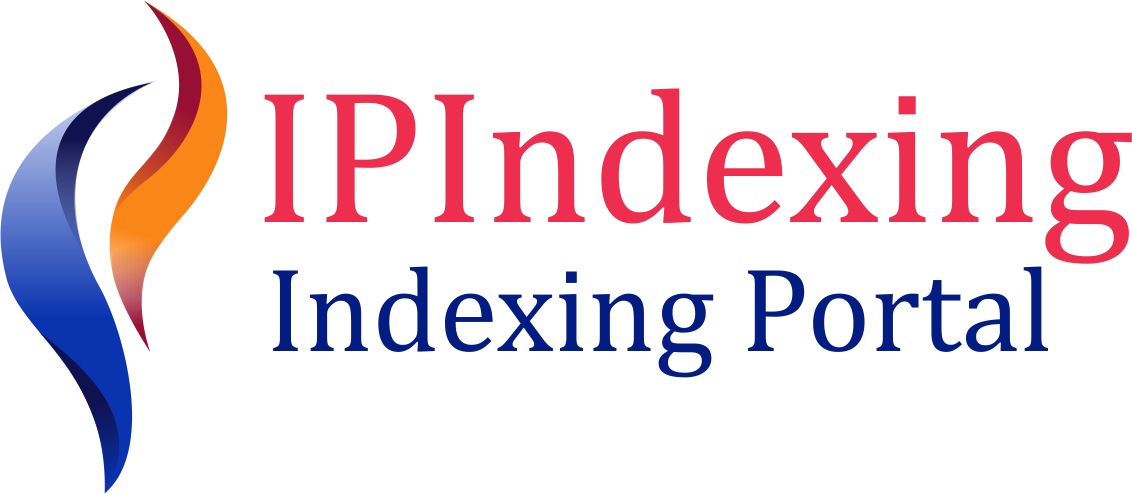 Ip Indexing is here to provide a platform for indexing the journals, which will patronage the journal to become an authoritative source of scientific information. This is a single platform for segregation quality control, open access journals, comprehensive information, easy to discover, citation, link, retrieve and reuse from all over the world. The Ip Indexing journal's profile is available in the next link.
Ip Indexing is here to provide a platform for indexing the journals, which will patronage the journal to become an authoritative source of scientific information. This is a single platform for segregation quality control, open access journals, comprehensive information, easy to discover, citation, link, retrieve and reuse from all over the world. The Ip Indexing journal's profile is available in the next link.
 ERIH PLUS is an academic journal index for Europe's HSS (Humanities and Social Sciences) society. We provide an article search facilitated by Dimensions, which allows the in-depth exploration of the 10 000 ERIH PLUS journals. We also mark the individual journals thoroughly with crucial information about open access status and plan S compliance. The ERIH PLUS journal's profile is available in the next link.
ERIH PLUS is an academic journal index for Europe's HSS (Humanities and Social Sciences) society. We provide an article search facilitated by Dimensions, which allows the in-depth exploration of the 10 000 ERIH PLUS journals. We also mark the individual journals thoroughly with crucial information about open access status and plan S compliance. The ERIH PLUS journal's profile is available in the next link.
 LatinREV is the cooperative network of journals and associations of academic journals in the social sciences and humanities created at the request of the Department of State and Public Policies and the “Enzo Faletto” Social Sciences Library. Its purpose is to provide advice, training, and updates on issues related to the sustainability of publications. Likewise, LatinREV offers a collaborative and participatory space to disseminate information of interest to editorial teams. For this, LatinREV organizes an academic day with specialists in the subject for the exchange and discussion of relevant axes for this field of academic production that is held in June of each year. The LatinREV journal's profile is available in the next link.
LatinREV is the cooperative network of journals and associations of academic journals in the social sciences and humanities created at the request of the Department of State and Public Policies and the “Enzo Faletto” Social Sciences Library. Its purpose is to provide advice, training, and updates on issues related to the sustainability of publications. Likewise, LatinREV offers a collaborative and participatory space to disseminate information of interest to editorial teams. For this, LatinREV organizes an academic day with specialists in the subject for the exchange and discussion of relevant axes for this field of academic production that is held in June of each year. The LatinREV journal's profile is available in the next link.
 BruKnow is the Brown University Library's simple and powerful search tool for finding books, ebooks, articles, journals, videos, digital media, and more. BruKnow can also help you manage your research. The BruKnow journal's profile is available in the next link.
BruKnow is the Brown University Library's simple and powerful search tool for finding books, ebooks, articles, journals, videos, digital media, and more. BruKnow can also help you manage your research. The BruKnow journal's profile is available in the next link.
 An International Standard Serial Number (ISSN) is an eight-digit serial number used to uniquely identify a serial publication, such as a magazine. The ISSN is especially helpful in distinguishing between serials with the same title. ISSNs are used in ordering, cataloging, interlibrary loans, and other practices in connection with serial literature. The ISSN journal's profile is available in the next link.
An International Standard Serial Number (ISSN) is an eight-digit serial number used to uniquely identify a serial publication, such as a magazine. The ISSN is especially helpful in distinguishing between serials with the same title. ISSNs are used in ordering, cataloging, interlibrary loans, and other practices in connection with serial literature. The ISSN journal's profile is available in the next link.
 Directory of Open Access Scholarly Resources (ROAD) provides free access to those ISSN bibliographic records which describe scholarly resources in Open Access: journals, conference proceedings, and academic repositories. These records, created by the ISSN Network (88 National Centres worldwide + the International Centre), are enriched by information about the coverage of the scholarly resources by indexing and abstracting databases, registries, and journal indicators. The ROAD journal's profile is available in the next link.
Directory of Open Access Scholarly Resources (ROAD) provides free access to those ISSN bibliographic records which describe scholarly resources in Open Access: journals, conference proceedings, and academic repositories. These records, created by the ISSN Network (88 National Centres worldwide + the International Centre), are enriched by information about the coverage of the scholarly resources by indexing and abstracting databases, registries, and journal indicators. The ROAD journal's profile is available in the next link.
 Keepers Registry acts as a supervisor of the archiving agreements of digital journals and has three main objectives: To allow librarians and legislators to know who is taking care of which digital journals, how, and under what conditions of access. Warn about digital magazines, what is at "risk of loss," and what needs to be archived. Showcase archiving organizations worldwide, for example, the Keepers, which provides digital shelving for long-term access to content. The Keepers journal's profile is available in the next link.
Keepers Registry acts as a supervisor of the archiving agreements of digital journals and has three main objectives: To allow librarians and legislators to know who is taking care of which digital journals, how, and under what conditions of access. Warn about digital magazines, what is at "risk of loss," and what needs to be archived. Showcase archiving organizations worldwide, for example, the Keepers, which provides digital shelving for long-term access to content. The Keepers journal's profile is available in the next link.
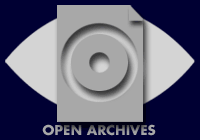 The Open Archives Initiative Protocol for Metadata Harvesting (OAI-PMH) is a low-barrier mechanism for repository interoperability. Data Providers are repositories that expose structured metadata via OAI-PMH. Service Providers then make OAI-PMH service requests to harvest that metadata. OAI-PMH is a set of six verbs or services invoked within HTTP. The OAI-PMH journal's profile is available in the next link.
The Open Archives Initiative Protocol for Metadata Harvesting (OAI-PMH) is a low-barrier mechanism for repository interoperability. Data Providers are repositories that expose structured metadata via OAI-PMH. Service Providers then make OAI-PMH service requests to harvest that metadata. OAI-PMH is a set of six verbs or services invoked within HTTP. The OAI-PMH journal's profile is available in the next link.









